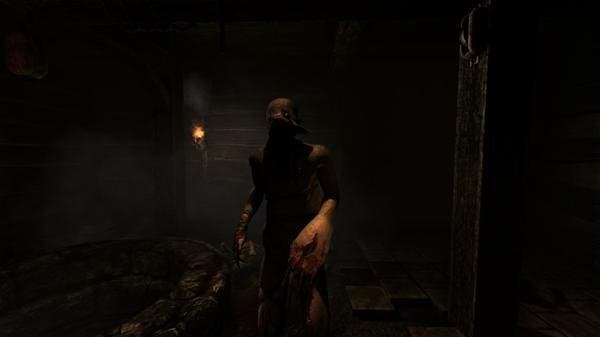What Makes Horror Games Scary?
Why we fear the fake.
It is strongly believed that animals (humans included) developed the ability to experience fear as a survival mechanism. This doesn't quite explain why some people are terrified of clowns, but it's a pretty good explanation for why many people try to avoid heights, snakes and Pyramid Head.
However, some of us actively engage our fears. Some people afraid of heights ride roller coasters, some orphidiophobes watch Snakes on a Plane and many gamers afraid of Pyramid Head will still play Silent Hill 2.
"Fear in and of itself is not an enjoyable emotion," says Weaver. "In fact, from an evolutionary perspective we're strongly motivated to avoid the stimuli that cause fear, because those stimuli are generally dangerous.
"That said, there are a few reasons people might actively seek out frightening games or movies."
One of the reasons Weaver proposes is that people use those experiences as a way to gain a sense of control over stressful times in their own lives. He notes that research has shown horror to become most popular during periods of widespread stress such as violent crime waves, high unemployment or when national security is threatened.
A large part of the audience for horror media is adolescent males, and Weaver suggests that gender roles could play a part in this. He says that young males feel a need to watch or play horror games and films. The idea is that they are proving their manhood to others and themselves by showing they aren't troubled by experiencing these scenarios.
"Even though males experience the same physiological reactions and aversive feelings that females do, males feel a disproportionate need to consume this content and, when they do, to not look away or act in any way that would signal that they were uncomfortable with it," Weaver says.
Madigan, who also writes about psychology for US magazine GamePro, says it could be a question of taste. "Psychologists think some people are just sensation seekers who like to be emotionally aroused.

"Similarly, other people seem to be attracted not to being scared, but to the chance to see social norms violated in ways that they'll never encounter in real life. They don't necessarily want to repeat these acts themselves, but they find it exciting to experience it vicariously through others."
However, these effects aren't necessarily permanent. Our brains grow with us as we age and horror junkies are constantly teaching their brains to differentiate between real and media, building mental defences in the process. According to Madigan, that's not necessarily a bad thing.
"There's a school of thought that people are attracted to scary situations because they help them prepare mental strategies for dealing with real-life situations that may be not quite the same but which still deal with the same anxieties," he says.
"It seems to be human nature to seek out these "practice runs" through fiction, play fighting and other safe venues. Our brains may be wired to simultaneously know that what we're perceiving is fictional, but to still get an emotional punch out of it because it's ultimately beneficial to our mental well being."
Even if we're not consciously aware of the causes, the elements that allow game developers to instill fear in players have yielded incredible results, from the earliest survival horrors like Resident Evil to modern evolutions like Amnesia: The Dark Descent.
It seems likely designers will continue to learn from their predecessors to create even greater horror experiences. Whether it's merely an adolescent proving ground or a form of terrifying catharsis, horror has earned its place within gaming.







